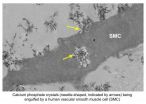(Press-News.org) RAPID RESISTANCE to vemurafenib – a treatment for a type of advanced melanoma, the deadliest form of skin cancer – could be prevented by blocking a druggable family of proteins, according to research* published in Nature Communications today (Thursday).
Scientists at the Cancer Research UK Manchester Institute, based at the University of Manchester, have revealed the MLK family of four enzymes 'undoes' the tumour-shrinking effects of vemurafenib**.
Around half of metastatic melanomas – aggressive skin cancer that has spread to other parts of the body – are caused by a fault in the cell-growth gene BRAF, causing the signal telling cells to multiply to be permanently switched on.
Vemurafenib blocks BRAF and stops the cancerous cells from growing. But cancer cells usually find a different way to turn the pathway back on – cancelling out the drug's effects. Most metastatic melanoma patients stop responding to the drug within about six months, leading to a relapse of the disease.
This new research has found MLK enzymes can be responsible for reactivating the BRAF pathway, even in the presence of vemurafenib. By blocking these enzymes, which previous studies have shown is already possible, the researchers hope they can stop resistance to vemurafenib so the cancer cells are still vulnerable to the drug.
The findings also show that some melanoma patients have additional gene mutations that switch MLK genes on, causing patients to develop resistance to vemurafenib more quickly.
Lead author, Dr John Brognard, at Cancer Research UK Manchester Institute, said: "This exciting research reveals that melanoma cells have enzymes acting like a manual override switch to regenerate growth signals – even after vemurafenib has switched them off.
"Additionally, this family of enzymes are turned on in metastatic melanomas that are not caused by BRAF, suggesting they may serve as a new target in metastatic melanomas for which there are limited treatment options.
"The good news is there are already experimental drugs that can block these enzymes in the laboratory. And this research paves the way for the development of drugs to overcome vemurafenib resistance in melanoma patients."
Professor Nic Jones, Cancer Research UK's chief scientist and director of the Manchester Cancer Research Centre, a partnership between CRUK, The University of Manchester and The Christie NHS Foundation Trust, said: "This exciting research opens new routes to treat this difficult disease. Thanks to people's generosity we've funded research that revealed that the BRAF gene is behind around half of all melanomas. And several drugs that target BRAF are now showing promise in clinical trials.
"Rates of melanoma in Britain are now five times higher than in the mid-1970s, but survival rates have also improved, with more than eight in 10 surviving for more than 10 years.
"We hope this latest research will lead to new treatments enabling even more people to beat this disease. Melanoma research is a key priority for the Manchester Cancer Research Centre."
INFORMATION:
For media enquiries please contact Simon Shears on 020 3469 8054 or, out-of-hours, the duty press officer on 07050 264 059.
Notes to Editors:
*Marusiak, A., et al Mixed-lineage kinases activate MEK independently of RAF to mediate resistance to RAF inhibitors Nature Communications
**Vermurafenib, owned by Roche, is only suitable for metastatic melanoma patients with the V600E BRAF fault.
Vemurafenib doesn't cure advanced melanoma. But it can prolong life by months, relieve the symptoms of the disease, and shows more clinical effect than almost every other treatment for advanced melanoma.
Vermurafenib is licensed for sale in the UK but it has not yet been approved by NICE or the Scottish Medicines Consortium (SMC) for routine NHS use. NICE is assessing the clinical evidence that Roche has provided.
Until NICE approval, patients in England can ask their clinician to request the drug via the Cancer Drugs Fund; those living in the rest of the UK can apply to Exceptional Case Committees or related bodies.
About Cancer Research UK
Cancer Research UK is the world's leading cancer charity dedicated to saving lives through research.
Cancer Research UK's pioneering work into the prevention, diagnosis and treatment of cancer has helped save millions of lives.
Cancer Research UK receives no government funding for its life-saving research. Every step it makes towards beating cancer relies on every pound donated.
Cancer Research UK has been at the heart of the progress that has already seen survival rates in the UK double in the last forty years.
Cancer Research UK supports research into all aspects of cancer through the work of over 4,000 scientists, doctors and nurses.
Together with its partners and supporters, Cancer Research UK's vision is to bring forward the day when all cancers are cured.
For further information about Cancer Research UK's work or to find out how to support the charity, please call 0300 123 1022 or visit http://www.cancerresearchuk.org. Follow us on Twitter and Facebook
The University of Manchester
The University of Manchester, a member of the Russell Group, is one of the largest and most popular universities in the UK. It has 20 academic schools and hundreds of specialist research groups undertaking pioneering multi-disciplinary teaching and research of worldwide significance. According to the results of the 2008 Research Assessment Exercise, The University of Manchester is one of the country's major research institutions, rated third in the UK in terms of 'research power'. The University has an annual income of £807 million and is ranked 40th in the world and fifth in the UK for the quality of its teaching and impact of its research.
Scientists find new way to combat drug resistance in skin cancer
2014-05-22
ELSE PRESS RELEASES FROM THIS DATE:
Canada funds 65 innovative health projects to help save every woman, every child
2014-05-22
Grand Challenges Canada, funded by the Government of Canada, today announces investments of $12 million in projects worldwide, aimed squarely at improving the health and saving the lives of mothers, newborns and children in developing countries.
From a "lucky iron fish" placed in tens of thousands of Asian cooking pots to reduce anemia, to "motherhood insurance" to ensure that poverty doesn't impede emergency care if needed during a baby's delivery, to kits for home farming edible insects to improve nutrition in slums of Africa and Latin America, the 65 imaginative projects ...
New insights into premature ejaculation could lead to better diagnosis and treatment
2014-05-22
There are many misconceptions and unknowns about premature ejaculation in the medical community and the general population. Two papers, both being published simultaneously in Sexual Medicine and the Journal of Sexual Medicine, provide much-needed answers that could lead to improved diagnosis and treatment for affected men.
Premature ejaculation can cause significant personal and interpersonal distress to a man and his partner. While it has been recognized as a syndrome for well over 100 years, the clinical definition of premature ejaculation has been vague, ambiguous, ...
Could cannabis curb seizures? Experts weed through the evidence
2014-05-22
The therapeutic potential of medical marijuana and pure cannabidiol (CBD), an active substance in the cannabis plant, for neurologic conditions is highly debated. A series of articles published in Epilepsia, a journal of the International League Against Epilepsy (ILAE), examine the potential use of medical marijuana and CBD in treating severe forms of epilepsy such as Dravet syndrome.
In a case study, Dr. Edward Maa, Chief of the Comprehensive Epilepsy Program at Denver Health in Denver, Colo., details one mother's experience of providing medical marijuana to her child ...
Scientists announce top 10 new species for 2014
2014-05-22
SYRACUSE, N.Y. — An appealing carnivorous mammal, a 12-meter-tall tree that has been hiding in plain sight and a sea anemone that lives under an Antarctic glacier are among the species identified by the SUNY College of Environmental Science and Forestry's (ESF) International Institute for Species Exploration (IISE) as the top 10 species discovered last year.
An international committee of taxonomists and related experts selected the top 10 from among the approximately 18,000 new species named during the previous year and released the list May 22 to coincide with the birthday, ...
Temperature influences gender of offspring
2014-05-22
Whether an insect will have a male or female offspring depends on the weather, according to a study led by Joffrey Moiroux and Jacques Brodeur of the University of Montreal's Department of Biological Sciences. The research involved experimenting with a species of oophagous parasitoid (Trichogramma euproctidis), an insect that lays its eggs inside a host insect that will be consumed by the future larvae. "We know that climate affects the reproductive behaviour of insects. But we never clearly demonstrated the effects of climate change on sex allocation in parasitoids," Moiroux ...
Decision to jettison end of life Liverpool Care Pathway 'too extreme'
2014-05-22
The decision to jettison the approach to care of the dying, known as the Liverpool Care Pathway (LCP), was "too extreme," given that its principles are widely regarded as among the best examples of palliative care in the world, argues a senior ethicist in the Journal of Medical Ethics.
The LCP, which was intended to transfer the principles of hospice care to hospitals, fell foul of poor application by healthcare professionals and widespread misunderstanding of its scope and purpose among the general public, argues Dr Anthony Wrigley of the Centre for Professional Ethics ...
Improved GP access in standard hours may trump extended opening times
2014-05-22
Improving family doctor access during standard working hours might be better for reducing out of hours service use than extending the opening times of GP surgeries, suggests research published online in Emergency Medicine Journal.
If the link between access and out of hours service use is causal, this approach could cut demand for the latter by a maximum of 11%, the findings indicate.
Difficulties getting to see a GP when needed have been blamed for fuelling the rise in demand for out-of-hours primary care services, including emergency care. But there is not much evidence ...
Training brain patterns of empathy using functional brain imaging
2014-05-22
An unprecedented research conducted by a group of neuroscientists has demonstrated for the first time that it is possible to train brain patterns associated with empathic feelings – more specifically, tenderness. The research showed that volunteers who received neurofeedback about their own brain activity patterns whilst being scanned inside a functional magnetic resonance (fMRI) machine were able to change brain network function of areas related to tenderness and affection felt toward loved ones. These significant findings could open new possibilities for treatment of ...
Protective proteins reduce damage to blood vessels
2014-05-22
Researchers have uncovered how proteins found in our blood can reduce damage caused to blood vessels as we age, and in conditions such as atherosclerosis and arthritis.
Calcification is a major risk factor for heart attack and stroke. Blood vessels can harden as calcium phosphate (CaP) crystals, normally found in bones and teeth, build up in soft tissue as we age or as a result of illness. This can lead to complications in patients with atherosclerosis, a major cause of death in the UK whereby arteries thicken and are at risk of becoming blocked.
However a team of scientists ...
Disruption of circadian rhythms may contribute to inflammatory disease
2014-05-22
A disruption of circadian rhythms, when combined with a high-fat, high-sugar diet, may contribute to inflammatory bowel disease and other harmful conditions, according to a recent study conducted by researchers at Rush University Medical Center. The study is online at the peer-reviewed, open-access journal, PLOS ONE.
"Circadian rhythms, which impose a 24-hour cycle on our bodies, are different from sleep patterns," said Robin M. Voigt, PhD, assistant professor at Rush Medical College and first author of the study. "Sleep is a consequence of circadian rhythms," Voigt said.
While ...

